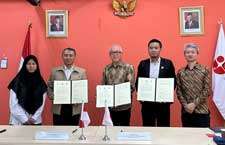 Tyre firm Bridgestone Corporation has announced that it has joined a project conducted by the Fukuoka Bio Community and has commenced a collaborative research initiative with Kyushu University and National Research and Innovation Agency (Indonesian: Badan Riset dan Inovasi Nasional, BRIN) of Indonesia. The goal of the research project is to develop prevention technology for White Root Disease (WRD) in Para rubber trees and to contribute to the improvement of productivity at natural rubber plantations.
Tyre firm Bridgestone Corporation has announced that it has joined a project conducted by the Fukuoka Bio Community and has commenced a collaborative research initiative with Kyushu University and National Research and Innovation Agency (Indonesian: Badan Riset dan Inovasi Nasional, BRIN) of Indonesia. The goal of the research project is to develop prevention technology for White Root Disease (WRD) in Para rubber trees and to contribute to the improvement of productivity at natural rubber plantations.
Natural rubber is a key raw material in tyre manufacturing and is an essential renewable resource for producing high-quality tyres. Also, it is a renewable resource that provides livelihood opportunities for millions of people around the world. It is said that more than 6 million people are involved in the cultivation of natural rubber.
WRD, which affects rubber trees, a natural rubber resource, is a disease that causes tree death by infecting the roots with pathogenic fungi and causing tissue decay. Since the onset is difficult to detect and to discover, it poses a challenge to the sustainable and stable supply of natural rubber. By developing technology to prevent infection by the fungi causing the disease, the project aims to stabilise the yield of natural rubber and improve the stable productivity of natural rubber plantations.
Kyushu University and BRIN will select candidate microorganisms and substances that inhibit the proliferation of the pathogenic fungi in plants and soil, and Bridgestone will conduct tests of these infection prevention technologies at its own natural rubber plantation in Indonesia. The goal is to establish preventive technology by 2030, and in the future, to expand and support the operation of this technology and know-how for small farmers who are key contributors to natural rubber production, thereby promoting productivity improvements and enhancing the quality of life among small farmers and building a sustainable supply chain for the natural rubber industry.
Bridgestone will lead this project within the Fukuoka Bio Community, which is promoted in collaboration with Fukuoka Prefecture and Kurume City, where the company was founded.
The Fukuoka Bio Community is one of the regional bio communities certified based on the “Bio Strategy” promoted by the Cabinet Office. With Kurume Research Park serving as its secretariat, Fukuoka Prefecture and Kurume City collaborate to create new industries and bio-ventures centred on biotechnology. The aim is to form a bio community comprised of biotechnology-related companies and research institutions.
